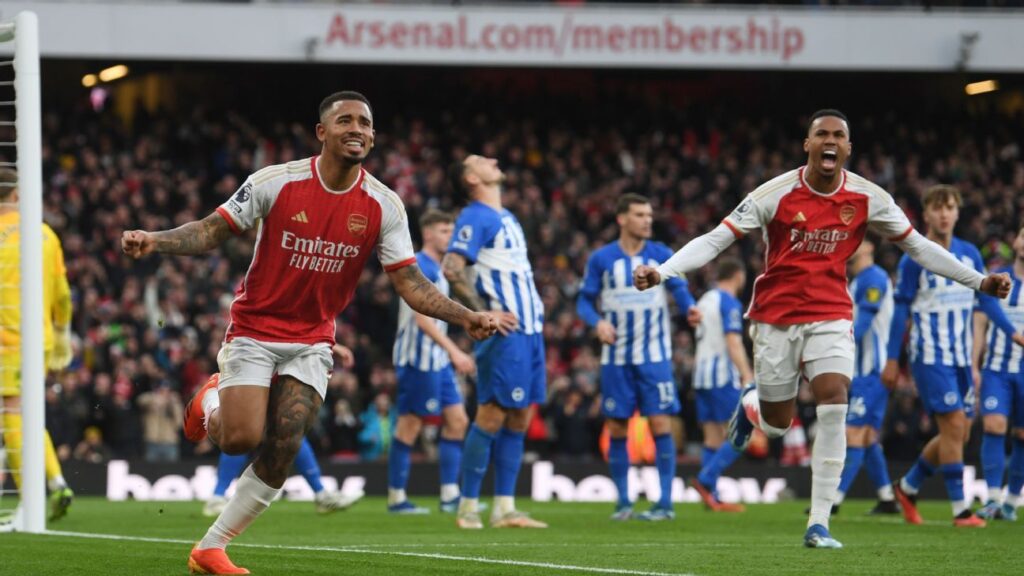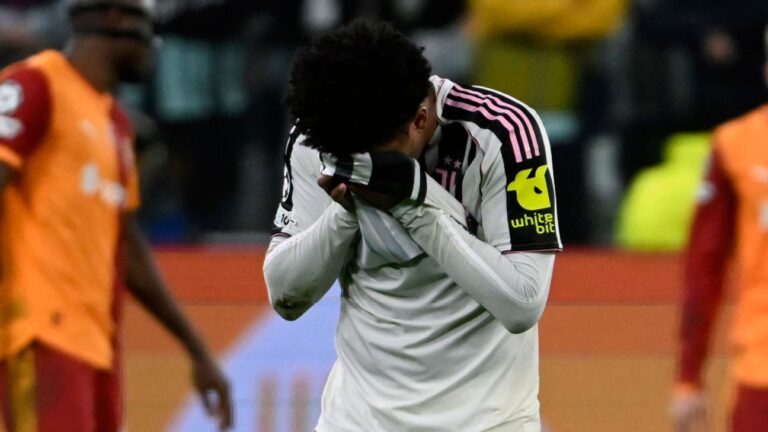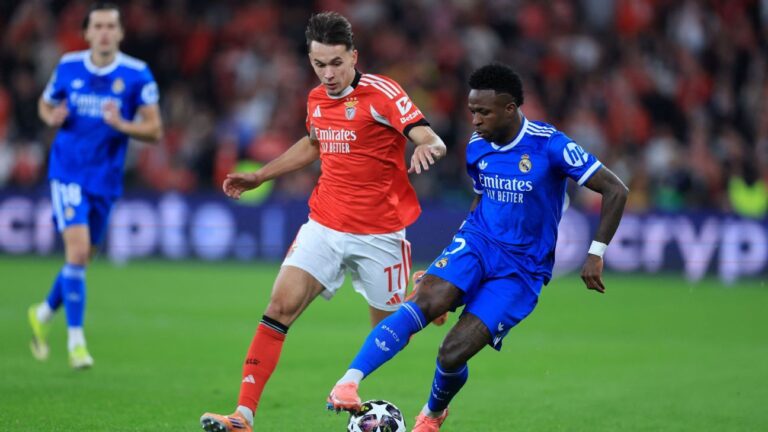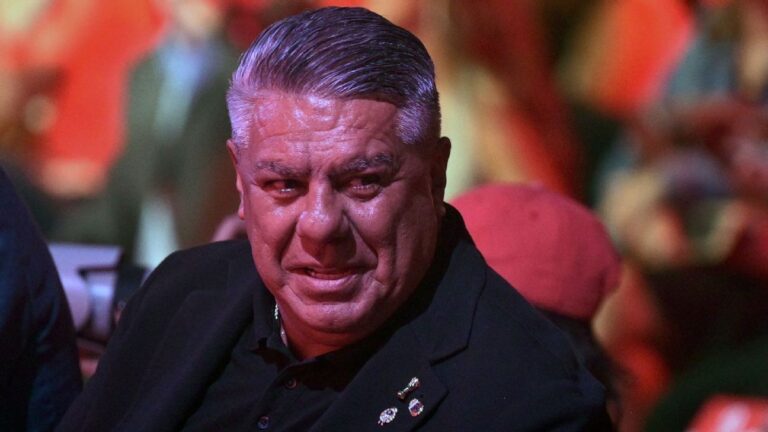It’s the holiday season, and European soccer was in a giving mood this weekend, with a ton of big talking points up and down the big leagues. In the Premier League, Arsenal shrugged off Brighton for an impressive win that keeps them top given Liverpool’s inability to beat Man United despite taking 34 shots in 90 minutes. In LaLiga, Real Madrid reclaimed top spot with a big win over Villarreal, but the joy was short-lived given yet another long-term injury suffered to a first-team regular, David Alaba.
In the Bundesliga, Harry Kane scored twice as Bayern eased past Stuttgart, but Xabi Alonso and Bayer Leverkusen won to remain in charge of the title race. Elsewhere, there were talking points galore for Atletico Madrid, Inter, Napoli, Chelsea and Manchester City.
– Stream on ESPN+: LaLiga, Bundesliga & more (U.S.)
It’s Monday, and Gab Marcotti reacts to the biggest moments in the world of football.
Arsenal may have had more impressive wins this season than the 2-0 victory over Brighton — with the ice being broken only in the second half and the second coming on the counter late on — but in terms of performance, it looked very much like how Mikel Arteta had drawn things up in his mind. Yes, the finishing could have been better, but Arsenal out-footballed a footballing side like Roberto De Zerbi’s for much of the game, while conceding very little at the other end.
It was also pretty close to the best XI — you can debate Ben White over the injured Takehiro Tomiyasu, but the setup is the same — and that means Kai Havertz with Martin Odegaard in midfield.
Havertz has had his (many) critics, and for all of Arteta’s adjustments, there’s little question that his presence affects Odegaard (and not always in a good way), which may explain why the latter’s numbers are down this season. But given the massive investment in the German, it’s evident that he’ll be given time, and rightly so.
Havertz played almost exclusively as a center-forward after his first campaign at Chelsea. With Germany, he has been deployed both up front and even as a left-back (don’t ask). He’s the typical player who get scouts salivating — tall, athletic, technically gifted, strong in the air and with attitude — only for coaches then not to be sure how to get the best out of him.
I’m not sure Arteta has found the balance just yet, and there will be games where Havertz’s presence will be unsustainable. Brighton could have been one of those games if De Zerbi’s combination of possession and verticality had worked. But it wasn’t, largely because Arsenal showed the right combination of sharpness and calm, at least until the final third. Havertz was a big part of that.
The Premier League’s top spot will likely change hands several more times between now and the end of the season, and Arsenal are far from perfect. But in terms of putting a major piece into place, they took a big step forward on Sunday.
The headlines in some quarters of the Catalan press are all about how Barcelona have taken one point from the last three games, Real Madrid are seven points clear at the top of LaLiga, Girona could be nine points clear come Monday night, and if Atletico win their game in hand, Xavi’s crew are a lowly fourth, with Athletic Bilbao and Real Sociedad in the rearview mirror. That’s why some are talking about Xavi’s job being at risk and also why, maybe, he talked about the importance of three points away to Valencia on Saturday.
In the end he didn’t get them, as Barca had to settle for a 1-1 draw. In normal circumstances, with a normal club, you could reflect on the fact that Barcelona put together a more than healthy 2.85 expected goals, and only some poor finishing stopped them from getting three or four. Oh, and that Valencia’s goal came after a gargantuan (and uncharacteristic) defensive blunder from Ronald Araújo, who let the ball bounce before Hugo Guillamón’s stunning finish. Or that the midfield looked a lot better with Pedri playing a little bit deeper with Frenkie De Jong. Or that Raphinha was, at times, unplayable.
Instead, the screws are turning on Xavi.
I get the fact that the Joan Laporta rolled the dice, pulling his levers, mortgaging the future and trying to assemble a star-studded team that could win straight away. And so, the stakes are higher. But this is still a team that faced Valencia with three guys in key roles who weren’t there just six months ago — plus Iñaki Peña between the sticks, rather than the injured Marc-André ter Stegen. There’s no instant fix and no real reason to believe that somebody else — on a similar contract, with this group of players — can do a substantially better job than Xavi.
It’s been a running theme: Liverpool have been getting results (before Sunday, four wins in their last five plus a draw away to Manchester City, which, let’s face it, is kinda like a win) without playing particularly well or looking particularly sharp. Jurgen Klopp himself has recognised this multiple times, and the good news is if they got this far without firing on all cylinders, imagine where they can be if they hit their peak. Except, at some point, you start to wonder when (and whether) they’ll actually come together.
Sunday’s scoreless draw against a Manchester United side that, understandably, hunkered down and looked to hit on the counter is in some ways a reflection of this, though, obviously they didn’t get the three points. They dominated possession and had a whopping 34 shots on goal, but with few obvious “must-score” chances. On a different day, it’s enough to win because there’s enough talent that somebody converts one of those low xG chances. On Sunday, it wasn’t. The quality chances weren’t there, and there wasn’t enough quality from the players to make the others work.
As for United, you can’t blame Erik ten Hag for taking the approach he did. Between the injuries and the suspension to Bruno Fernandes, expectations were low and he went safety first. The players embraced it which, I guess, is something. But you imagine his future — and United’s season — may be decided in the three games they play between now and mid-January: West Ham and Nottingham Forest away, Aston Villa at home.
One of the reasons coaches get paid the big bucks is their ability to be resourceful and solve problems. Carlo Ancelotti has made a career out of it.
On Sunday against Villarreal, we saw a de facto front two of Brahim Díaz and Rodrygo, two guys who few even had as projected starters and few thought of as outright forwards. But the chemistry between the pair was near instantaneous and they played a huge part in the 4-1 win. So did Jude Bellingham (no surprise there) and Luka Modric (maybe a bit more surprising, given his recent grumbles over playing time), while Modric also hit the crossbar and conjured up a delicious assist for the opener. He may not be happy all the time, but thus far, it looks like Ancelotti is squeezing max productivity out of him.
The downside to this game is David Alaba’s cruciate injury, which will see him miss the remainder of the 2023-24 season. This is a club that already lost their starting keeper (Thibaut Courtois) and best defender (Éder Militão) to season-ending injuries, and had their biggest attacking threat (Vinícius) miss nearly half the team’s league starts. They weathered all that, but it’s hard to see how, at this point, they can afford not to wade into the transfer market for a central defender this January.
Aurélien Tchouaméni may well be an option in that role, but given the age of Modric and Toni Kroos and given the injuries to Eduardo Camavinga, he’ll probably be needed in midfield. I’d expect a veteran, possibly a loan, just to plug the gap and give Ancelotti options beyond Nacho and Antonio Rüdiger.
Saturday’s 2-2 home draw against Crystal Palace means Manchester City have won just one of their past six Premier League games. They’ve played well in some and poorly in others, and there’s been no real pattern other than subpar results.
This weekend yielded another disappointing result, but other than individual defensive mistakes (both Phil Foden giving away the penalty and the clear run on goal for Jean-Philippe Mateta’s score) and poor finishing in Erling Haaland’s absence (regular readers will know this is something I’m never really concerned about, since it’s far harder to create quality chances than it is to finish them), I thought there wasn’t much wrong with City. Heck, before Mateta’s goal, the expected goals stood at 1.61 to 0.03.
Yes, you want more concentration late in games, and yes, you want defenders winning individual battles but City’s style of play means there will always be more one-on-one defending required than most teams and that’s when mistakes are more likely to happen.
More of a concern, however, is the practical impact on the table. City are fourth, five points back from league leaders Arsenal, and because they’re off to the Club World Cup, they could be 11 points back by the time they play their next Premier League game. Sure, games in hand and all that, but it’s still looking uphill. And making up ground on three teams is a bigger challenge than doing so on just one.
I have no idea when Bayern last had 37% possession at home and still won. I do know it’s not what marked their last decade of success, but it worked a treat against Stuttgart, because whatever else they may be fast and have a prodigiously smart center-forward in Harry Kane. (His two goals on Sunday took him to 20 on the season in the league, 24 overall). Stuttgart opted to go for the jugular, so Bayern let them have the ball and punished them in transition.
In some ways, it was a throwback to some of Thomas Tuchel’s Chelsea sides in their Champions League-winning campaign. It no doubt had a lot to do with Aleksandar Pavlovic (making only his second league start) and Raphaël Guerreiro playing in central midfield rather than Joshua Kimmich and Leon Goretzka, but you wonder if this is something Tuchel doesn’t mind.
Playing deeper and relying on the break plays to his wingers’ strengths and offers cover to his beleaguered center-backs. It may not satisfy the purists in the team’s Sabener Strasse HQ, but then neither does being stuck behind Bayer Leverkusen at the top.
Simone Inzaghi’s old club gifted him a goal when Lautaro Martínez punished Adam Marusic’s ill-judged blind back pass towards the end of the first of Lazio vs. Inter and from that moment on, there was no looking back. Marcus Thuram added a second after the break and that was that. Another win, and a larger lead at the top.
It’s easy to get blase about Inter, but Inzaghi seems to have a knack for finding the answers. He quickly worked out that without Luis Alberto, Lazio would likely exploit the wings with Felipe Anderson and Mattia Zaccagni, and he quickly took countermeasures.
Few teams can play you in as many different ways as Inter can, and few managers exact the tactical tweaks that Inzaghi does in the course of a game. When it doesn’t work, we call it “needless tinkering,” but it’s working now, and that makes him one of the best around. At least for now.
Another week, another test for Xabi Alonso’s Bayer Leverkusen. This time it was Eintracht Frankfurt, fresh off their 5-1 drubbing of Bayern Munich the previous weekend. Would they hold up against Dino Toppmoller’s press? Would they ever.
It finished 3-0, with Victor Boniface taking his season goal total to 15 and Florian Wirtz getting on the scoresheet as well (after hitting the woodwork). They remain the only undefeated side in Europe’s Big Five leagues, and they raced through their Europa League group winning six of six games. Oh, and unlike their fancier competitors — like RB Leipzig, Borussia Dortmund and, of course, Bayern — they’re still alive in the German Cup too.
Xabi Alonso couldn’t have imagined a better campaign.
Maybe some of us got carried away in thinking Atletico Madrid could seriously challenge for the title this season. Maybe some of us needed to be reminded that there’s plenty of competition beyond the usual “big two” plus upstarts, Girona. Like Real Sociedad… and Ernesto Valverde’s Athletic Club.
On Saturday, Valverde’s side dominated Atletico Madrid far more than the 2-0 scoreline suggests. Jan Oblak made some big saves, Bilbao missed a penalty, both Williams brothers (Inaki and Nico) hit the woodwork. Atletico never got going and lost their third straight road game.
Simeone’s side still have a game in hand, of course (and could leapfrog Barcelona into third), but games like these — when Antoine Griezmann has an off-day and the build-up play from deep doesn’t work — remind you just what a soft touch Atletico 2.0 can be at times.
PSG haven’t really played full throttle in Ligue 1 of late, and that’s understandable: they’re five points clear and nobody expects a challenge. On Sunday away to Lille, it cost them two points in a 1-1 draw.
Maybe it was a hangover from the Borussia Dortmund clash in midweek, but after taking the lead through a Kylian Mbappé penalty (he has 19 goals overall now) they looked to manage the lead and see out the game. Which is fine, but you have to stay sharp until the end and Marco Asensio wasn’t, with his mistake leading directly to Jonathan David’s equalizer deep in injury time.
It’s not a problem in isolation, but let it be a reminder that games last 90 minutes.
Say this for Stefano Pioli: he’s unafraid to take risks. Against a resurgent Monza, he not only wheeled out a back three (which he hadn’t seen in a long time), but one that included (at least until he got injured) a midfielder in Tommaso Pobega. Most managers who feel pressure — and Pioli no doubt does — would keep things simple and stick to the tried and tested. But that’s part of what makes Pioli successful: the willingness to experiment even if, occasionally, it blows up in his face.
The big boost for Milan though comes from the newcomers, some of whom have been criticised this season. Tijani Reijnders ran the middle of the park with quality and, especially now that Ismaël Bennacer is back, you feel he can be even more effective. Noah Okafor’s cameo lasted just 13 minutes, but he showed just why some of us are so excited about his pace and ability to beat opponents.
And then there’s Jan-Carlo Simic, just 18, playing more than an hour and scoring on his debut. (In case you’re wondering, no, his dad isn’t Dario Simic — this Simic is Serb, that Simic is Croatian — but the original Simic does have sons who play football, the most notable being Roko, who plays up front for Salzburg.)
OK, so it’s not a great side when Chelsea moving back into the top 10 is some sort of achievement. Or when the guy carrying the team is a 21-year-old who arrived in the waning hours of the transfer window. (So much for planning, eh?) But Chelsea can’t dwell on their mistakes right now, other than as a series of teachable moments: they need to crank out the results.
Sheffield United may be the Premier League’s cellar-dwellers, but they got a lift with the return of manager Chris Wilder, and Chelsea had somebody named Djordje Petrovic was making his first start in goal, replacing the injured Robert Sánchez, Enzo Fernández was on the bench, with an insipid first half making many at Stamford Bridge fear the worst. But the second half saw Palmer get more joy (once Mauricio Pochettino shifted him to a wider area), and it was he who opened the scoring and set up Nico Jackson for the second.
There are still plenty of questions, but at least a bit of joy with the three points and the sight of summer signing Christopher Nkunku on the substitutes’ bench.
The good news if you’re a Napoli fan is that Victor Osimhen and Khvicha Kvaratskhelia are standing up to be counted. Osimhen scored on and set up another for the Georgian, the home support is great and the 2-1 win over Cagliari was more one-sided than the scoreline suggests. Oh, and they passed Roma and are now one point out of the top four.
On the flip side, in terms of approach, there’s little left of the side that thrilled Serie A (and a big chunk of Europe) last season. Walter Mazzarri’s approach is still safety first, with individuals — at certain times — given free rein to hurt the opposition. That’s fine when Kvara and Osimhen are doing their thing, but it’s light years away from the collective we saw a year ago.
You’d think that coming off a high — topping the supposedly toughest Champions League group over Paris Saint-German, Newcastle United and AC Milan — Borussia Dortmund would build on that and acquire confidence and consistency.
Nope.
Away to Augsburg, Edin Terzic tried a more attacking setup — a 4-1-4-1 formation with Julian Brandt and Marco Reus behind Niclas Fullkrug, plus two wingers out wide — that didn’t quite work. They had the chances to win, but it looked disjointed and, again, they were left exposed, as they showed when Nico Schlotterbeck got outmuscled for the Augsburg opener. Leave your defenders one-on-one enough times, and they’ll be a single mistake away from gifting the opposition a clear run on goal.
For all their Champions League exploits, the focus has to be on getting back there and, after the weekend, they’re five points out of the top four.




